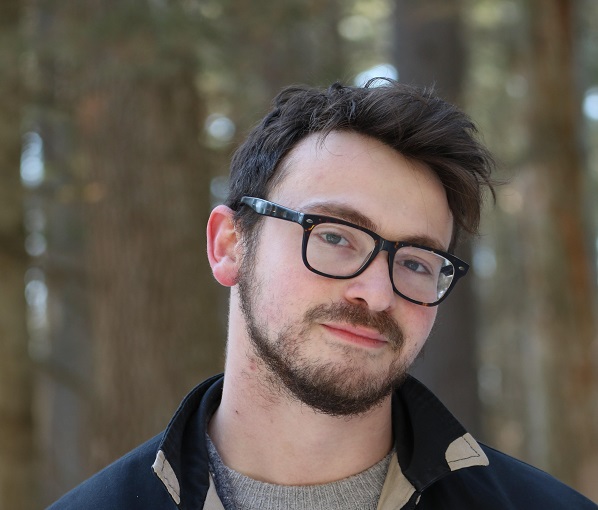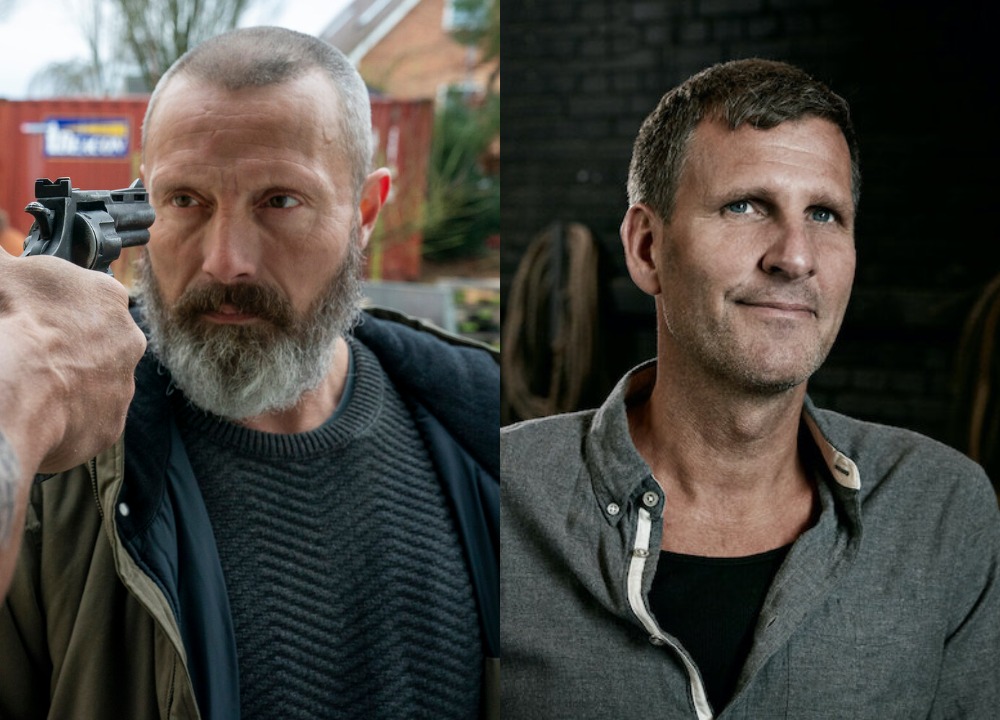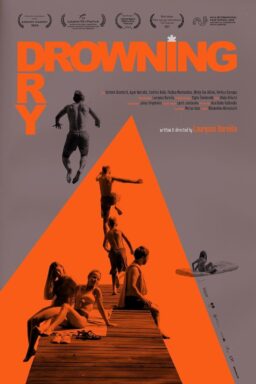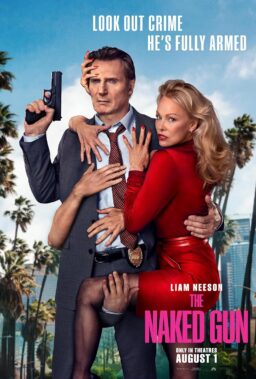In this week’s “Riders of Justice,” a military man named Markus (Mads Mikkelsen, recently seen in Denmark’s Oscar-winning “Another Round”) returns home to his teenage daughter (Andrea Heick Gadeberg) after his wife dies in a train accident. But when a trio of probability scientists—Otto (Nikolaj Lie Kaas), Lennart (Lars Brygmann), and Emmenthaler (Nicolas Bro)—visits him to suggest the tragedy could have been orchestrated, Markus targets the local biker gang he believes responsible.
If this sounds like the setup for a pitiless action-thriller, well, yes and no. The fifth collaboration between Mikkelsen and writer/director Anders Thomas Jensen, this “revenge dramedy” does allow Markus to channel his rage into outbursts of jarring violence. But as in the pair’s previous collaborations—“Flickering Lights,” “The Green Butchers,” “Adam’s Apples,” and “Men & Chicken”—a vein of pitch-black absurdist humor runs beneath the brutality.
Though all of Jensen’s past premises have suggested outré mash-ups, from “Sweeney Todd in a Danish suburb” to “the Three Stooges on the Island of Doctor Moreau,” Jensen has a way of injecting zany concepts and detestable characters with frank, relatable humanity. Mikkelsen has appeared in each of Jensen’s past films, which have in return offered the actor his most unhinged roles: as an emotionally stunted triggerman (“Flickering Lights”), a horribly coiffured meat-shop owner (“The Green Butchers”), a fanatically optimistic priest (“Adam’s Apples”), and a compulsive masturbator exploring his genealogical origins (“Men & Chicken”).
In “Riders of Justice,” though, Mikkelsen’s performance gives the film its gravity. With his shaved head and gray beard, Markus cuts an intimidating figure even before his world is shattered by grief, and Mikkelsen conveys the soul-deep despair that’s turned his tactical, combat-tested abilities even deadlier. But as Jensen threads a tonal needle between vigilante action and existential comedy, each side of “Riders of Justice” uncovers something deeper and more profound in the other.
A touching story about the futility of healing from grief or imposing any kind of governing logic over a chaotic universe, “Riders of Justice” is also a tensely coiled thriller that leaves a trail of bullet-riddled bodies in its wake. Jensen and Mikkelsen both spoke recently over Zoom about the film and where it fits within their long-running creative collaboration.
Interview has been edited and condensed.
Anders Thomas, how did “Riders of Justice” first take shape for you?
ANDERS THOMAS JENSEN: It started with me having this completely normal 40-year crisis that all men have where you look at your kids, you look at your life, and you wonder, “How did I get here, and did I do enough?” You start rebuilding, you start looking forward, and you start looking for connections that will give your life meaning. That’s basically Markus’ character, a guy with PTSD returning home who’s lost faith in everything but needs to find a way to move forward in his life. Of course, it’s highly dramatized, but the core is very personal for me.

Mads, as Markus, you’re playing the straight man, which is fairly new to you in terms of your collaborations with this writer/director.
MADS MIKKELSEN: A straight man you wouldn’t want to meet. [raises eyebrow] As far as I remember, I think Anders Thomas pitched both the story and the idea of morphing his two dramatic universes together: his own “insanity world,” and his more [straightforward] writer side, which writes dramatic things for others … Normally, he pitches me his stuff, and if I call him and say, “What the f**k are you doing?,” then that’s a good sign. Because it’s always insane, what he’s doing, and if I’m on board it gives him the confidence to continue writing.
You’ve known each other for decades, even before your first collaboration [2000’s “Flickering Lights”] as actor and director. How did you first meet, and what was that initial meeting like?
ATJ: [laughs]
MM: You want to go there, Thomas?
ATJ: Let’s do it.
MM: Let’s be honest. We had a brief encounter of 10 minutes. He had a big mouth. I had a big mouth. And then we just jumped into a fight at a birthday party, and ended up with two of the biggest female stars in Denmark at that time hitting us with handbags to make us stop fighting. That was the introduction. And then a year later, we worked together.
ATJ: That’s completely true.
There’s a slapstick quality to the violence to many of your films, Anders Thomas, but also a knowing dark humor that explores the nature of mortality. Has that always been a fascination of yours?
ATJ: It’s the meaning of life, right? As soon as you reach fifth or sixth grade, as soon as you discover your parents are going to die at some point, you begin this journey. I haven’t been constantly aware of it. It comes and goes in my life. But it is something that’s always there, like good and evil are always there. There are these core themes, so they keep popping up. The problem with giant themes like these is that they’ve been so explored in earlier works [of art] for the last thousand years, so it can feel banal to attempt to bring something to them. It’s already in every one of us. I just try to put it in a new context and mix the genres.
MM: There’s also a way of getting away with it. It can come across as pretentious or banal to be one-to-one with topics like this. You’ll have characters keenly aware of their situations, addressing it, and giving big monologues about it … But if you wrap it up in some kind of insanity, all of a sudden you can get away with talking about the largest topics of existential crisis.

At one point in “Riders of Justice,” a character reassures a young girl, “You’re not dead inside … But you are chubby.” That balance of humor and pathos matters so much when you’re talking about grief, trauma, and the chaos of the universe. There has to be something funny about it, or else it’s impossible to bear.
ATJ: That’s really it. And I agree in real life! I’ve laughed the most at funerals … Sometimes, life is like Monty Python-sized shit when you look at it, and I honestly can’t understand how people without a sense of humor get through life. I really can’t. It’s such a help when you reach the dark spots, too, to take a step back and throw a little glib comment in there, to look at it another way. That helps me, and I think it helps a lot of people. It’s the same as in drama. Think of a person who’s only ever dark and has no sense of humor. You wouldn’t want to drink a beer with them, would you?
In the writing process, how do you go about perfecting that balance?
ATJ: Normally, I’ll put a structure up on the wall then write a script from that. But when I write for myself, I don’t do that. With a script like this, it was a gut feeling. Especially in this film, it had to be a gut feeling. You had to get around so many characters and themes and layers, and if you put that up on the wall, it becomes somehow schematic. You can see the technicality of it. People in film schools hate when I say this, but it’s not something I can teach anyone.
MM: In this film, you’re morphing together two different universes, as we’ve discussed. Let’s put it this way: in a straightforward drama, if I was pitching a plan of how I was going to do what I wanted to do to these three guys, and one of them keeps talking about the Bahn, and then there’s another joke, and somebody else has a further joke, myself or somebody else in the room would be like, “That’s not what we need; we have to be focused on this [mission]!” But because it’s not like that, my character can be the audience, and I can look at them and go, “Is this what I’ve got? Is this my gang?” And then I can pull them back to the table eventually.
I have to live with that as an actor. “Okay, there’s a time-out of 20 seconds now where they’re throwing the ball around.” But on the other hand, [the other actors] have the same issue, because they’ll sit in the car with me and go over what we’re going to do while driving out to this guy. “We’re just going to talk to him,” they say. “Can we agree on that? We’re just going to talk to him.” And then the next thing you know, I’m not just talking to him. I’m doing something very much more than that. [laughs]
But these characters are looking at it. You can take seriously the brutality, and when you cut to these guys, it’s become absurd, because they’re realizing they’ve been left with another insane person. If you look at [the film] that way, you can get away with it. But if you look at it as one straightforward genre, that would be tricky.
I thought about “Flickering Lights” while watching “Riders of Justice,” especially during one scene where the characters shoot cans off a woodpile, which is very reminiscent of a scene in that previous project. Are you intentionally nodding to your past films in this one?
MM: My character in “Flickering Lights,” who has an affection for guns, is not a grown-up. And this character is obviously very much a grown-up. So in that, there’s a very big difference. But there is honestly a nod to the pathetic, romantic male bonding around guns.
ATJ: Honestly, it wasn’t intentional, but when we shot that scene with the cans on the logs, I looked into the monitor after we set up, and I thought, “Holy shit. This is too much like ‘Flickering Lights.’” Also, the location I had chosen … It was all subconscious. “Flickering Lights” is us, and this film is us, so it’s not conscious, but you will run into yourself when you’re doing different stuff down the line. It definitely reminded me of that.

The darkly comic tone of your films has drawn comparisons to the Coen Brothers and Quentin Tarantino. How do you stay clean to what your own authentic visions are, as actor and filmmaker, regardless of the broader assessments some will make?
ATJ: I’ve been compared to far worse things than the ones you mention there. I basically just do what I do. You read things, sometimes you agree and sometimes you don’t. Perhaps when I was younger, I tended to get inspired by it, but it doesn’t really affect me anymore.
MM: I do have a tendency to—and this is going to sound pretentious, what I’m saying—to want to put people in boxes, and it’s definitely true for journalists as well. They’re asked to describe what it is they’re watching, and they have to put it in a place where they can define it. As a result, films like Anders Thomas’ will be put in different boxes. As you said, they’re not the worst to be compared with, but it’s a very unique style of filmmaking Anders Thomas has, and because they can’t really figure out what it is, they just have to put it in a box.
ATJ: They’re these hybrids, right? Every time we have to talk with distributors, we have to talk about genre, because you need to put a damn genre on it. I hate genres in that sense. It’s a selling point, like having Italian or sushi, so that audiences will get exactly what they want, to laugh or cry. I think that’s so boring and old-fashioned. I love films that play with genres.
MM: It travels really differently, too. I’ve been with our others at festivals, for example in the Bahamas once with “The Green Butchers,” where it was nominated for an award. Since Thomas wasn’t there, I was there representing it. And when it won, there was a speech justifying why, and in their world it became clear it had played as a pure drama: heartfelt, dramatic, ultimately a heartbreaking story. And I was sitting there in the audience like, “Should I tell them it’s a comedy? Or should I just accept the award?”
ATJ: “Flickering Lights” won a horror film festival in Italy.
[Both laugh]
Mads, I must congratulate you on the success of “Another Round,” which won the Oscar for Best International Feature last month.
MM: Thanks.
Both of you are considered guiding lights of the Danish film industry, and your respective bodies of work span decades. How has the Danish cinema evolved since you started, especially as it’s gained recognition worldwide with films like “Another Round” and this one?
ATJ: For me, the biggest thing about Danish filmmakers is that we are a very, very small community. We share ideas, and we help each other. It’s something that started with Lars von Trier and the Dogme 95 movement, really. I’ve seen the power of us reading each other’s scripts, and I read for other directors while letting my stories be read. Together, we’re better.
MM: Though Denmark can be placed on a map, there’s no coincidence in that sense that, “Oh, there’s a certain way to do it in Denmark, and anyone can pick that up and make a great film.” We just live in a time when there’s more than one or two really big talents making films. That couldn’t have been done in the ‘30s, maybe, but it’s happening now. But what’s unique is that our budgets are so small that, if you have talent and ambition as a director, and you make a film, it’s not the producer’s film—or 20 different producers’ film. Whatever’s in your heart is coming out on the screen. That’s a little unique compared to people dealing with $40-80 million films. If the director turns out to be great, it will come across.
“Riders of Justice” outgrossed “Another Round” to earn the highest-grossing opening weekend in Denmark last year. What have the reactions been like so far?
ATJ: The reaction for me has been widely positive. That’s not always the case. “Men & Chicken,” I still get hate mail. [laughs] Some films [land] and others don’t. The notices remind me to keep writing characters that stay within the boundaries of what is relatable to a normal, thinking person. It’s fun to push the limit, but you need to have the feeling that it’s grounded in reality beneath. Sometimes, and this is just a personal thing for me, I think I push that a little too far. But I don’t want to do normal dramas or normal comedies. It gave me hope for my next few films.
MM: The one thing we were worrying about from the beginning was, “Can this bastard child between drama and insanity-universe come across and be relatable to other people in Denmark?’ And that was the case.” And now it turns out to be mostly the case around the world. And that’s a big win.
“Riders of Justice” plays the Independent Film Festival Boston this Tuesday before opening in LA/NY theaters on Friday. An on-demand rollout will follow on May 21.












